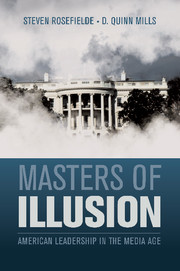Book contents
- Frontmatter
- Contents
- List of Tables and Figures
- Preface
- Acronyms
- Executive Summary
- Acknowledgments
- PART I NATIONAL SECURITY IN THE NEW AGE
- PART II AMERICAN PUBLIC CULTURE AND THE WORLD
- PART III AMERICAN PUBLIC CULTURE AND OURSELVES
- PART IV THE RECONFIGURATION OF NATIONAL WEALTH AND POWER
- PART V VORTEXES OF DANGER
- PART VI THE AMERICAN RESPONSE
- 13 Strategic Independence: An Ounce of Prevention
- 14 America as Mature Superpower
- PART VII LEADING TOWARD PEACE
- PART VIII AMERICAN PRESIDENTIAL LEADERSHIP
- Notes
- Glossary
- Bibliography
- Index
13 - Strategic Independence: An Ounce of Prevention
Published online by Cambridge University Press: 31 July 2009
- Frontmatter
- Contents
- List of Tables and Figures
- Preface
- Acronyms
- Executive Summary
- Acknowledgments
- PART I NATIONAL SECURITY IN THE NEW AGE
- PART II AMERICAN PUBLIC CULTURE AND THE WORLD
- PART III AMERICAN PUBLIC CULTURE AND OURSELVES
- PART IV THE RECONFIGURATION OF NATIONAL WEALTH AND POWER
- PART V VORTEXES OF DANGER
- PART VI THE AMERICAN RESPONSE
- 13 Strategic Independence: An Ounce of Prevention
- 14 America as Mature Superpower
- PART VII LEADING TOWARD PEACE
- PART VIII AMERICAN PRESIDENTIAL LEADERSHIP
- Notes
- Glossary
- Bibliography
- Index
Summary
Strategic Independence is a new American strategy that can be integrated into America's engagement with the world. Strategic Independence means independence of today's weakened alliances in determining our geopolitical strategy and of overdependence on nuclear deterrence in defending our country.
Recent administrations have been groping toward this strategy, and the Bush administration has taken a long step toward it, though it has not yet completely embraced the strategy. Strategic Independence is a comprehensive approach to defending America without the dangers inherent in deterrence and the excesses involved in trying to remake the world in the interests of our security. Strategic Independence is modest in scope, effective in action. Strategic Independence is the means; pluralism in the world is the end, as we cannot effectively reengineer other cultures into our image of democratic free enterprise.
AN ALTERNATIVE TO MULTILATERALISM
Strategic Independence is an alternative to multilateralism (which is discussed in Chapter 16). Strategic Independence and multilateralism are both tactics, not absolutes, and are not preferable for themselves but, rather, as means to an end – the safety of our country. It is possible to combine them to a degree – advocates of Strategic Independence expect our country to seek allies in carrying out specific missions.
Since the end of World War II, U.S. Strategy has been dependent on both allies and enemies.
- Type
- Chapter
- Information
- Masters of IllusionAmerican Leadership in the Media Age, pp. 305 - 331Publisher: Cambridge University PressPrint publication year: 2006



